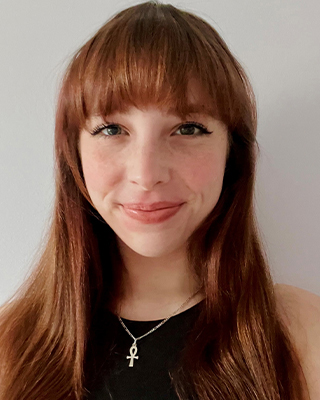Internship offers hands-on neuroscience laboratory research experience
Erin Clouthier, who is from the Métis Nation, has a passion for neuroscience. However, the University of Victoria undergraduate student (pictured below) was having a difficult time finding a paid work experience opportunity to explore the basic science aspect of the field. That is, until she saw the IBRO-CBH Summer Research Internship Awards for Canadian Indigenous Undergraduate Students on the UVic Co-op website.
 “I saw this grant and thought, ‘This is exactly what I want to do. I want to work in a lab; I want see the research side of a career in science looks like. It’s hard to see that when you’re just in a classroom or in a teaching lab,” she says.
“I saw this grant and thought, ‘This is exactly what I want to do. I want to work in a lab; I want see the research side of a career in science looks like. It’s hard to see that when you’re just in a classroom or in a teaching lab,” she says.
Erin is spending the summer in the Christie Lab. After a couple of weeks exploring different projects, she has settled in to help investigate the use of choline and exercise as a potential treatment for fetal alcohol spectrum disorder (FASD). “It’s a really inspiring project,” she says. This research was funded by the National Institute on Alcohol Abuse and Alcoholism (R37AA012446) to Dr. J. Thomas and Dr. B. Christie.
FASD is caused by prenatal ethanol exposure (PNEE), and it is one of the leading causes of neurodevelopmental impairment. It encompasses a range of physical, cognitive, and emotional impairments, but one of the most notable is a deficit in hippocampal synaptic plasticity, which negatively affects learning and memory. While there is no current treatment for FASD, it’s possible that the essential nutrient choline and exercise may improve outcomes following PNEE.
Erin is helping with the project’s morphology work. The team is using IBA-1 DAB staining to see if microglia are active or non-active in the hippocampus of subjects with FASD who have had choline- and exercise-based treatments. Erin’s tasks include digitizing the stained slides, helping with cell counts, and more. “It’s a lot of computer work and it’s definitely been a learning curve, but I’m really, really liking it so far,” she says. “I’m learning the research side of things consists of a lot of little tasks that all lead to something big.”
Along with hands-on research, Erin is immersing herself in lab life. She enjoys hearing about what other people are working on during lab meetings, and she has found plenty of great support and learning opportunities from the small, community-like team.
“Working in a lab is something I could see myself doing in the future,” she says. “Plus, neuroscience seems like something that could keep me busy! It’s really complex, and I like that there is a million different things that we still don’t know about the brain and how it works.”
Erin one of three students,including K’sana Wood Lynes-Ford and Lauren Aimoe (Faulkner), working in labs at the UVic Division of Medical Sciences this summer thanks to the IBRO-CBH Summer Research Internship Awards for Canadian Indigenous Undergraduate Students. Funded through a partnership between the International Brain Research Organization (IBRO) and the Djavad Mowafaghian Centre for Brain Health (CBH), the award aims to enhance opportunities for Indigenous undergraduate students to participate in neuroscience research. This is the first year the award, which began at UBC, has been offered at UVic.
